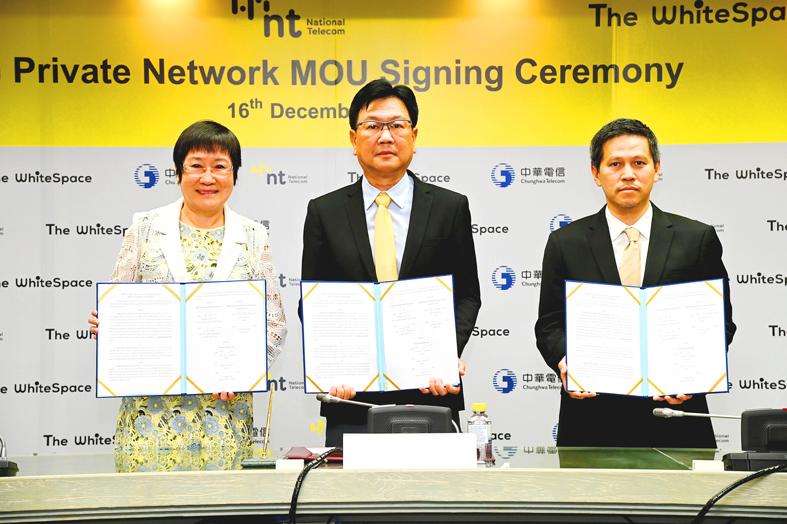Chunghwa Telecom Co (中華電信) has signed a memorandum of understanding with Thailand’s state-owned National Telecom PCL and WhiteSpace Co to build a 5G private network in collaboration with Delta Electronics (Thailand) PCL (泰達電), the companies said in a joint statement on Thursday.
It marks the latest effort by Chunghwa Telecom to expand its business in Southeast Asian after inroads into the Singaporean and Vietnamese markets.
The four-way cooperation would support the “Thailand 4.0” innovative manufacturing plan and assist the country in accelerating the adoption of 5G applications to introduce technologies such as the Internet of Things, artificial intelligence and big data, as well as increasing information security, they said.

Photo courtesy of Chunghwa Telecom Co
The firms would set up an augmented reality-based 5G private network that would be used for training assembly techniques, operational assistance and visual equipment control at two Delta facilities in the Bangpoo Industrial Estate near Bangkok, they said.
The project would also help realize innovative application services in the fields of smart manufacturing, remote collaboration and smart medical care, the firms said.
Chunghwa Telecom has been focused on expanding in Southeast Asia for a long time, seeking to “form alliances with high-quality international partners,” Chunghwa Telecom international business group president Sarah Wu (吳學蘭) said in the statement.
“We are convinced that through this cooperation, the company will reach a new milestone in the expansion of the ASEAN market, and usher in a new digital transformation service energy for Thailand and the ASEAN market,” she said, urging Taiwanese firms to join its efforts in the region.
National Telecom has obtained 5G licenses for operating 2,100 megahertz, 2,300 megahertz and 26 gigahertz frequency bands in Thailand. WhiteSpace is the country’s largest mobile virtual network service provider.

UNCERTAINTY: Innolux activated a stringent supply chain management mechanism, as it did during the COVID-19 pandemic, to ensure optimal inventory levels for customers Flat-panel display makers AUO Corp (友達) and Innolux Corp (群創) yesterday said that about 12 to 20 percent of their display business is at risk of potential US tariffs and that they would relocate production or shipment destinations to mitigate the levies’ effects. US tariffs would have a direct impact of US$200 million on AUO’s revenue, company chairman Paul Peng (彭雙浪) told reporters on the sidelines of the Touch Taiwan trade show in Taipei yesterday. That would make up about 12 percent of the company’s overall revenue. To cope with the tariff uncertainty, AUO plans to allocate its production to manufacturing facilities in

Taiwan will prioritize the development of silicon photonics by taking advantage of its strength in the semiconductor industry to build another shield to protect the local economy, National Development Council (NDC) Minister Paul Liu (劉鏡清) said yesterday. Speaking at a meeting of the legislature’s Economics Committee, Liu said Taiwan already has the artificial intelligence (AI) industry as a shield, after the semiconductor industry, to safeguard the country, and is looking at new unique fields to build more economic shields. While Taiwan will further strengthen its existing shields, over the longer term, the country is determined to focus on such potential segments as

TAKING STOCK: A Taiwanese cookware firm in Vietnam urged customers to assess inventory or place orders early so shipments can reach the US while tariffs are paused Taiwanese businesses in Vietnam are exploring alternatives after the White House imposed a 46 percent import duty on Vietnamese goods, following US President Donald Trump’s announcement of “reciprocal” tariffs on the US’ trading partners. Lo Shih-liang (羅世良), chairman of Brico Industry Co (裕茂工業), a Taiwanese company that manufactures cast iron cookware and stove components in Vietnam, said that more than 40 percent of his business was tied to the US market, describing the constant US policy shifts as an emotional roller coaster. “I work during the day and stay up all night watching the news. I’ve been following US news until 3am

COLLABORATION: Given Taiwan’s key position in global supply chains, the US firm is discussing strategies with local partners and clients to deal with global uncertainties Advanced Micro Devices Inc (AMD) yesterday said it is meeting with local ecosystem partners, including Taiwan Semiconductor Manufacturing Co (TSMC, 台積電), to discuss strategies, including long-term manufacturing, to navigate uncertainties such as US tariffs, as Taiwan occupies an important position in global supply chains. AMD chief executive officer Lisa Su (蘇姿丰) told reporters that Taiwan is an important part of the chip designer’s ecosystem and she is discussing with partners and customers in Taiwan to forge strong collaborations on different areas during this critical period. AMD has just become the first artificial-intelligence (AI) server chip customer of TSMC to utilize its advanced